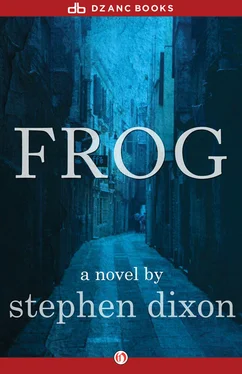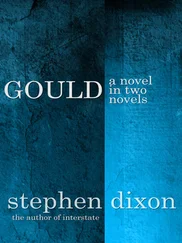Stephen Dixon - Frog
Здесь есть возможность читать онлайн «Stephen Dixon - Frog» весь текст электронной книги совершенно бесплатно (целиком полную версию без сокращений). В некоторых случаях можно слушать аудио, скачать через торрент в формате fb2 и присутствует краткое содержание. Год выпуска: 2013, Издательство: Dzanc Books, Жанр: Современная проза, на английском языке. Описание произведения, (предисловие) а так же отзывы посетителей доступны на портале библиотеки ЛибКат.
- Название:Frog
- Автор:
- Издательство:Dzanc Books
- Жанр:
- Год:2013
- ISBN:нет данных
- Рейтинг книги:5 / 5. Голосов: 1
-
Избранное:Добавить в избранное
- Отзывы:
-
Ваша оценка:
- 100
- 1
- 2
- 3
- 4
- 5
Frog: краткое содержание, описание и аннотация
Предлагаем к чтению аннотацию, описание, краткое содержание или предисловие (зависит от того, что написал сам автор книги «Frog»). Если вы не нашли необходимую информацию о книге — напишите в комментариях, мы постараемся отыскать её.
Frog — читать онлайн бесплатно полную книгу (весь текст) целиком
Ниже представлен текст книги, разбитый по страницам. Система сохранения места последней прочитанной страницы, позволяет с удобством читать онлайн бесплатно книгу «Frog», без необходимости каждый раз заново искать на чём Вы остановились. Поставьте закладку, и сможете в любой момент перейти на страницу, на которой закончили чтение.
Интервал:
Закладка:
She leaves with Gwynne. He sees Gwynne every Sunday, a month every summer, promises himself no more women ever. For what’s the use? He might get excited by one a few times, for weeks, a month, then it would happen again: Denise, letters, searches, praying and ranting like a madman, screwing up another woman’s life and maybe even another kid’s, confusing his other children’s lives even further. Or maybe he wouldn’t get excited by any woman but he’d try doing it with them from time to time to prove something — that he could still attract them, was still attracted by them — and how could he fake it now if he can hardly even get it up to do it to himself anymore? Olivia and Eva go to college, Gwynne to kindergarten. He likes living alone and getting older and gradually weaker; fewer chances; he can go crazy when he wants, so long as his daughters are away; drink till he passes out if he feels like it. He puts up photos of Denise all over the house. On walls, up against things: every photo he can find of her. Then has negatives made of his favorites and gets these made into positives and lots of them enlarged and puts them around too. He writes poems about her again, stories, one-act plays but they’re all terrible, bring back nothing to him, don’t make him cry or laugh or excited or anything and the writing stinks too, and throws them away. Does drawings and then portraits and whole-body paintings of her from memory. Several of them nude, but the only resemblance he thinks he gets is the shape and color of her vulva pubic hair. He puts one of the nudes on the floor, jerks off to it, when he’s about to come he falls flat on the canvas but miscalculates where he is on it and does it on her belly. Then he thinks this is disgusting, he’s gone from bad to almost hopeless, not only seeming nuts and becoming a dumb drunk and slob but doing something sickening and sick to her memory, and jumps on the painting, kicks a hole in it, rips it and all the other canvases off their stretchers, dumps the drawings and canvases and burns the brushes and stretchers. What now? No art form left to express himself about her. Music, but he can’t read a note and his extemporaneous piano playing is just banging. Singing, but his voice is flat. Dance, and he takes off his shoes and runs across the room in a dancing motion, eyes closed, arms out as if he’s going to embrace someone, and slams into a chair.
He throws away most of the photos. Leaves up a few of her with their daughters. Cleans the house, fixes up the yard, paints the girls’ rooms, gets some new furniture. Olivia goes to medical school, Eva joins a theater company, Gwynne enters the third grade. He retires, tries to drink moderately, exercises every day, wants to make himself look presentable and the house comfortable for his daughters when they visit him. He resumes reading a lot, mostly religion and philosophy now. He tries to find writers who can explain some things about his life. Who might have gone through what he did or some of it or just be better able to express it. His depressions and obsessions and other things: past mistakes and repeating them, Denise dying and his almost twenty-year reaction to it, how to lead the right life with his particular personality, whether the right life is a realistic or suitable goal for anyone, sex and love, sexuality and creativity, his heavy drinking sometimes. Who will make him want to turn to them when he needs to or thinks something terrible in him might be coming on. He can’t find any. A line here, there, a passage, a paragraph, sometimes the words click for pages or a chapter and he thinks this is the writer for him or the book he’s been looking for, he just knows, and goes through the whole book and gets increasingly disappointed, and maybe then through some of the other books of this writer, or at least one or part of one more.
He starts going to art museums and galleries, trying to find in the work there something that might apply to his life or be deep or hidden inside him or just give him pleasure in some way, maybe stimulate him to do creative work of his own again or what? Just to be at a big safe cultural place with other people he doesn’t know ambling by. One nude in a museum painting looks very much like Denise: body, face, hair when it hung loose. This isn’t what he came here for, he thinks, to find a figure in an artwork that looks like her, but he forgot that occasionally what gives him pleasure or makes him think about his life or sets off an action or idea leading to some kind of work comes unexpectedly like this. It isn’t the painting’s subject that interests him much, which is of a woman sitting on the edge of an unmade bed, drinking from a simple cup, holding a matching saucer in her other hand, seems to have slept nude and just woken up, clothes hanging out of a drawer and on the floor all seem to be hers, memo pad and uncapped pen by her leg, book, radio, eyeglasses, nailclippers and lamp on the night table, semiabstract seascape in a broken frame above the dresser, walls and furniture quite shabby, rowhouses through the completely opened window rundown and some of them torched, sun coming up over the tall building at the end of her block, clock between her feet says ten to twelve so it must be winter and some very northern country she’s in or the clock’s stopped. Painting’s called “Mourning Woman Rising,” though her face doesn’t show it — she just seems to be enjoying her day’s first coffee or tea — and if a double meaning’s meant, and it isn’t that she’s mourning for her poor circumstances or the stopped clock or neighborhood in some way, it gets by him. The painting was finished last year and bought for the museum by an anonymous donor. He goes back to this “New Acquisitions” room for weeks, stays in it for an hour or two daily, usually leaning against a wall, finally asks the guard, one of a few who float around this wing of the museum and he’s come to greet or say good-bye to, if a couch, as the museum used to have in almost every room years ago, couldn’t be put in this one so he and other people could look at the paintings and such without getting tired. The guard says something about crowd control, new museum rules, also the insurance company wouldn’t permit it, can’t. He wants to cut the woman out of the painting, take it home, hang it up but not to masturbate to it. He rarely tries that anymore to even a nude magazine photograph he might come upon or what to him is a provocative lingerie or swimsuit ad. Few days later he goes to the museum with a single edge razor blade to cut the figure or the whole painting out, whichever he can do fastest, but walking up the museum’s great interior stairway he says to himself “No, trouble again, and big trouble this time too if you’re caught, which you’ll be, of course, so go back, don’t look at it today, maybe even stay away from it from now on.”
He goes straight home, has a thought which he quickly writes on a piece of paper as he walks into the house: “Sometimes things you can never understand destroy you.” Not a bad thought, he thinks, complete and pungent, or one to come out of nowhere like that, if that’s what it did — at least the apparent nowhere — and tries to write another line but nothing follows it. Tries again several times that day, takes a pen and pad to bed with him in case something comes, tries to write a follow-up line the next morning, hoping it’ll lead to many lines, pages, even a book-length manuscript one day, then types the original line, scissors it out of the paper and tapes it on the wall above his typewriter. Then he writes it in inch-high letters and tapes it over the typewritten line. Then writes it in even larger letters using Gwynne’s crayons and tapes it on the refrigerator door. Then writes it in various sizes using different writing implements and tapes them around the house. Then buys poster boards and a poster paint set and starts painting the thought in two-feet-high letters, which he plans to nail to a living room wall, but stops a couple of words through and says “What am I doing now, that’s enough, don’t let it get the better of you as so much of the same thing did before and before and before.” He throws out the poster boards and paints, tears up all the papers around the house he had the thought on except the original handwritten one which he puts in his night table drawer, and goes back to reading novels, poetry, going to concerts, museums and plays, listens to a lot of recorded music while he cooks and eats and reads and rests or just contemplates, most of it for solo voice or all-male or all-female chorus but with no musical instruments and several centuries old, visits his oldest daughters in the cities they’re in, takes long walks, goes for a swim each day, has a coffee and torte now and then at a neighborhood coffeehouse, men and women become companions again, lots of interesting things to do and discuss and go to with them, but he always falls asleep holding his own penis.
Читать дальшеИнтервал:
Закладка:
Похожие книги на «Frog»
Представляем Вашему вниманию похожие книги на «Frog» списком для выбора. Мы отобрали схожую по названию и смыслу литературу в надежде предоставить читателям больше вариантов отыскать новые, интересные, ещё непрочитанные произведения.
Обсуждение, отзывы о книге «Frog» и просто собственные мнения читателей. Оставьте ваши комментарии, напишите, что Вы думаете о произведении, его смысле или главных героях. Укажите что конкретно понравилось, а что нет, и почему Вы так считаете.












